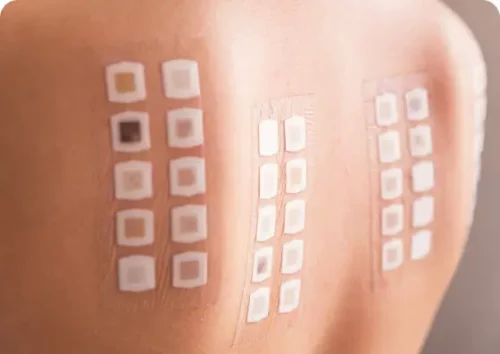
Allergy Patch Testing
Allergy patch testing is a common test used to confirm the cause of allergic contact dermatitis.
learn moreLatex allergies are relatively rare. According to some estimates, they only occur in 1 percent of the US population.
Latex allergies are caused by the body’s immune system reacting to latex-containing materials and objects. While many individuals believe that this allergy is caused by an allergic reaction to a chemical component, it is actually caused by an allergic reaction to the natural proteins found in rubber. The body mistakes the proteins in rubber with a dangerous, intrusive substance.
The body generates antibodies in reaction to its first encounter to latex. When the body is exposed to latex again, these antibodies cause a histamine reaction in order to fight back against the ‘dangerous’ chemical. This is known as sensitization, and it develops the body’s pattern of allergic response.
An individual’s allergic reaction can range from moderate to severe. A latex allergy can be fatal in the most severe situations. However, the vast majority of instances feature a mild to severe allergic reaction. Because even a mild reaction can cause discomfort, and because latex is found in many modern-day tools and accessories, persons who are allergic should consult with an allergist to construct a treatment plan and list of products to avoid.
While all latex allergies are triggered by the protein in the rubber plant, latex allergies can manifest in a number of different ways.
The most common way to trigger a latex allergy is through direct contact with a product that contains latex. Latex-containing products include many commonly used household items and medical accessories.
Patients can also trigger a latex allergy by inhaling latex. Latex products such as gloves can release some particles of latex into the air, especially when removing tight gloves. Finally, patients may also experience allergic contact dermatitis when they come into contact with latex products. This type of allergic reaction is actually triggered by the chemical additives used in the creation of latex products.
Signs of latex allergy vary widely from mild symptoms to severe and life-threatening symptoms. Any patient experiencing latex allergy symptoms that cause discomfort or interfere with their quality of life should seek out medical attention. In some cases, a patient may develop contact dermatitis after exposure to latex. This is not an allergic reaction but an associated condition that often appears with allergies.
Severe and Life-threatening symptoms associated with latex allergies include anaphylaxis. Anyone experiencing anaphylaxis and its associated symptoms should seek out medical attention right away. Anaphylaxis signs include:
Difficulty breathing
Dizziness
Wheezing
Confusion
Hives or swelling
Sudden drop in blood pressure
Loss of consciousness
Nausea and vomiting
Rapid or weak pulse
There are a wide range of latex allergy triggers in the modern world. These vary from common household items to products used in medicine. The following list includes some of the most common triggers:
There are many alternatives available to products that contain latex. Many hospitals, for example, use non-latex medical gloves. Condoms come in latex-free varieties as well. For patients with a severe reaction to latex, wearing a medical alert bracelet can be important given the prevalence of latex in today’s world.
Certain fruits contain the same proteins as rubber and can trigger a reaction in latex allergy patients. For this reason, it is important for patients to know what foods to avoid with a latex allergy. The latex food allergy list below contains the foods patients should avoid:
Those with a latex allergy are at a higher risk of having an allergy to these fruits. Consult with your allergist to determine whether you can consume any of these fruits if you have a latex allergy.
Finally, people with certain medical conditions are at a higher risk of developing a latex allergy. These include patients with Spina Bifida, patients who have undergone multiple surgeries, and health care and rubber industry workers. People with a family history or other allergies also have a higher risk of developing this condition.
Diagnosing a latex allergy involves multiple steps. As a starting point, your allergist will conduct a physical examination of your skin and also take a medical and family history. This will include questions about your symptoms and whether or not you have had reactions directly after contact with latex. While this interview can touch on personal topics, it is an essential part of the diagnostic process and helps your allergist rule out other causes of your symptoms.

Allergy Patch Testing
Allergy patch testing is a common test used to confirm the cause of allergic contact dermatitis.
learn more
Blood Testing for Allergies
Blood tests can tell if someone has allergies by finding antibodies in the blood that react to allergens.
learn more
Skin Allergy Testing
This is less invasive than blood tests and is a good alternative for patients who don’t like needles.
learn more
Immunotherapy
Immunotherapy is an ideal choice for patients with severe allergies or those unable to avoid exposure to an allergen.
learn more
How to treat latex allergy cases varies from patient to patient and depends on the severity of the patient’s symptoms. The best line of defense is to eliminate all exposure to latex. Since latex is present in so many products today, patients may wish to develop a comprehensive list of products to avoid with their allergist.
In mild cases, a patient’s symptoms can resolve independently without medical attention.
Latex allergy treatment can also involve the use of antihistamines in mild to moderate cases. These medications can reduce the body’s response during an allergic reaction to latex. More serious and chronic cases may require the administration of steroids.
In very severe cases where anaphylaxis is a risk, patients may need to carry injectable epinephrine with them on a daily basis. Wearing a medical alert bracelet can also help limit exposure to latex for these patients.
Patients who require latex allergy rash treatment may receive antihistamines and topical solutions. Whether a patient experiences mild symptoms or more serious ones, they should always seek out treatment if those symptoms interfere with their quality of life. Patients with any type of latex allergy can expect some resolution of or improvement in symptoms after a few weeks, if not sooner.